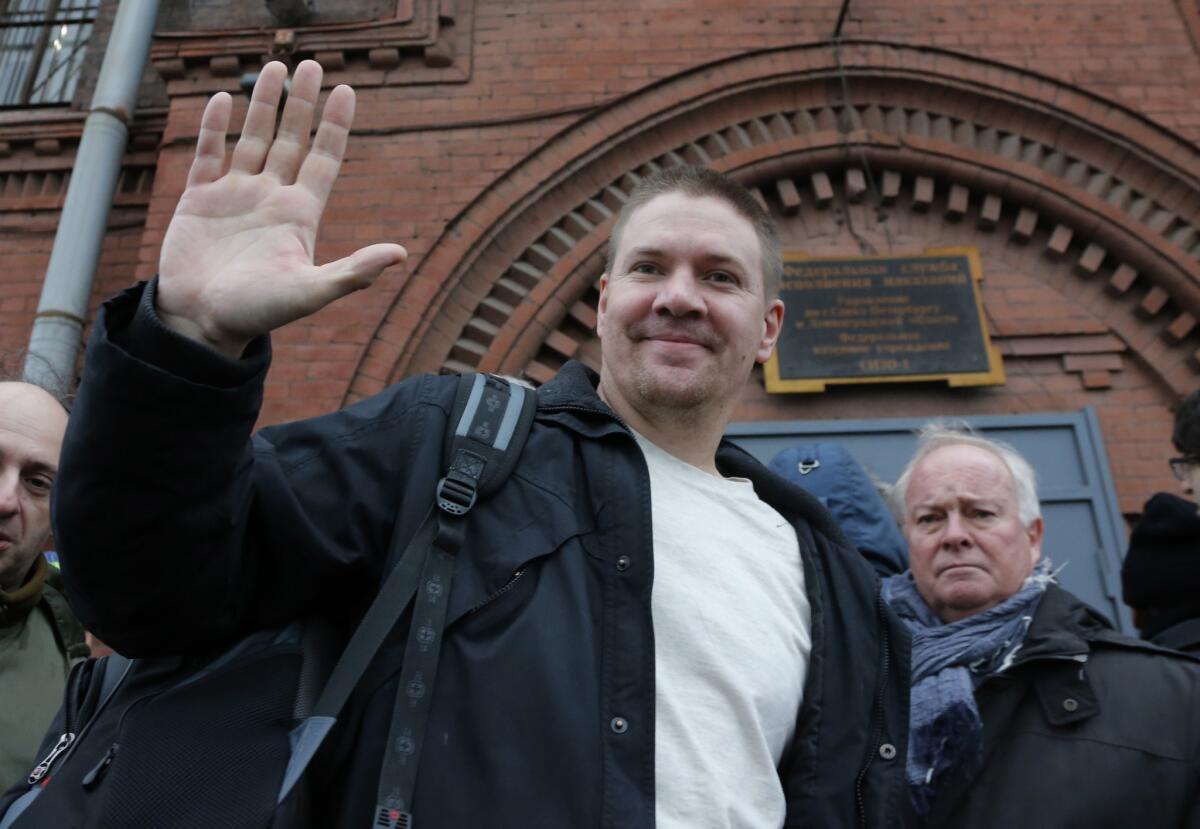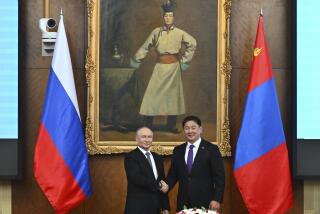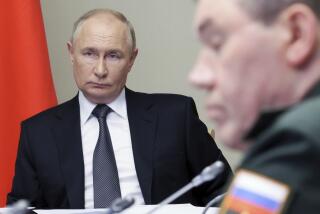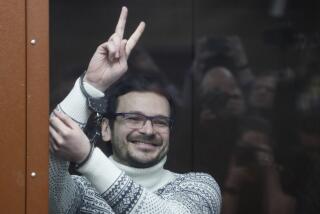Russia begins closing cases against Greenpeace activists

MOSCOW -- Investigators began closing criminal cases against 28 Greenpeace activists and two freelance journalists Tuesday as part of an amnesty viewed by many as an effort by President Vladimir Putin to polish Russia’s image before hosting the Olympic Winter Games.
“We have information that all 30 cases are being closed down, but not all the papers have been officially signed and stamped yet,” Greenpeace Arctic program coordinator Vladimir Chuprov said in an interview.
On Friday, tycoon Mikhail Khodorkovsky, once considered Putin’s most potent political foe, was freed after 10 years in prison. Two members of the punk music protest group Pussy Riot were freed Monday after 22 months in jail.
Like those released earlier, Greenpeace activists were not in the mood to thank Putin.
“Putin wanted to teach us a lesson, and from now on we will be considering risks we take in our future actions here,” Chuprov said. “But we have not been intimidated, and we have not been put on our knees. Nothing will prevent us from continuing our struggle for the Arctic’s environment.”
The activists were arrested in September when commandos dropped from helicopters onto the Greenpeace icebreaker Arctic Sunrise. A day earlier, some of the activists tried to climb the side of a Russian oil platform in the exclusive Russian economic zone in Barents Sea in order to protest oil drilling in the Arctic.
The ship was towed to Russia’s northern port of Murmansk, where the activists were jailed and accused of piracy, a charge which could carry up to 10 years of imprisonment.
The charges were later reduced to hooliganism and the detainees, who are from several countries, were transferred to St. Petersburg, where they were released on bail at the end of November pending the investigation.
The first case to be officially closed was that of British national Anthony Perret. But Perret still can’t leave the country because he entered without a visa. The Federal Migration Service said it will contact him Thursdsay regarding his visa.
“It’s time to go home, it’s time to get back to Wales, and I just got one big step closer,” Perret said in remarks distributed by Greenpeace. “I took peaceful action to defend a fragile region under profound threat and instead I was seized by armed commandos at sea and spent two months in detention. The Arctic is melting before our eyes, and yet the oil companies are lining up to profit from its destruction.”
Another member of the group, Greenpeace Russia spokesman Andrei Allakhverdov, said he was not inclined to thank Putin for the amnesty.
“My feeling are mixed: On the one hand I am glad it is all over; on the other hand, how can I forget the two months in Russian prisons even if we experienced it in the kind of Gulag light mode,” Allakhverdov said in a telephone interview from St. Petersburg. “It was a tough enough lesson, but it won’t prevent us from continuing to draw attention to the problems of the Arctic and we will not stop until it is turned into a natural reserve like the Antarctic.”
While the other high-profile prisoners recently freed also declined to thank Putin, Khodorkovsky said in Berlin on Sunday that he was glad Putin had acted. Nadezhda Tolokonnikova, one of the Pussy Riot members, called the amnesty ridiculous.
Political analyst Dmitry Oreshkin said the amnesty probably won’t do much to improve Putin’s international standing, but is likely to weaken his tough-guy image at home.
“Putin didn’t display real clemency or generosity, since his motives were solely guided by pressure coming from Western leaders and politicians, as well as from the civil society inside the country,” said Oreshkin, a senior researcher at the Russian Academy of Sciences’ Institute of Geography. “Most Western leaders are not coming to his Games in Sochi, anyway, and he has lost some footing with his supporters at home who eagerly applauded the imprisonment of Khodorkovsky, Pussy Riot, and the detention of the Greenpeace activists.”
[For the record, 4:45 p.m. PST: An earlier version of this post incorrectly said that Mikhail Khodorkovsky was released Sunday. He was released Friday.]
More to Read
Sign up for Essential California
The most important California stories and recommendations in your inbox every morning.
You may occasionally receive promotional content from the Los Angeles Times.










